 Petzlover
Petzlover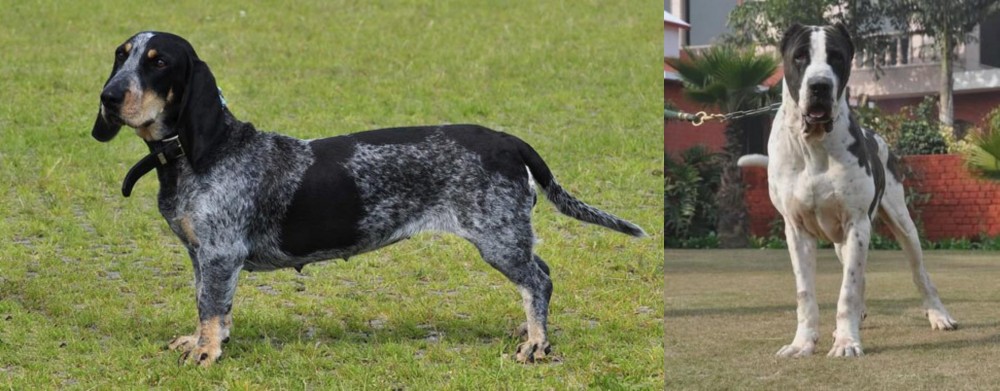 Basset Bleu de Gascogne is originated from France but Alangu Mastiff is originated from Pakistan. Basset Bleu de Gascogne may grow 48 cm / 18 inches shorter than Alangu Mastiff. Basset Bleu de Gascogne may weigh 72 kg / 158 pounds lesser than Alangu Mastiff. Basset Bleu de Gascogne may live 3 years more than Alangu Mastiff. Basset Bleu de Gascogne may have less litter size than Alangu Mastiff. Basset Bleu de Gascogne requires Moderate Maintenance. But Alangu Mastiff requires Low Maintenance
Basset Bleu de Gascogne is originated from France but Alangu Mastiff is originated from Pakistan. Basset Bleu de Gascogne may grow 48 cm / 18 inches shorter than Alangu Mastiff. Basset Bleu de Gascogne may weigh 72 kg / 158 pounds lesser than Alangu Mastiff. Basset Bleu de Gascogne may live 3 years more than Alangu Mastiff. Basset Bleu de Gascogne may have less litter size than Alangu Mastiff. Basset Bleu de Gascogne requires Moderate Maintenance. But Alangu Mastiff requires Low Maintenance
 The Basset Bleu de Gascogne is an old breed and also one of the most reserved of the Basset family. The Basset Bleu de Gascogne’s history can be traced back to the 14th century, originating in the region of Gascony, France. At one time there were very few of these dogs and Alain Bourbon began doing something about this in the early 20th century, although he didn’t document his breeding practices . There are theories though and one was that he bred a few of the very first Basset Bleu de Gascognes with the Basset Saintongeois and the Grand Bleu de Gascogne.
The Basset Bleu de Gascogne is an old breed and also one of the most reserved of the Basset family. The Basset Bleu de Gascogne’s history can be traced back to the 14th century, originating in the region of Gascony, France. At one time there were very few of these dogs and Alain Bourbon began doing something about this in the early 20th century, although he didn’t document his breeding practices . There are theories though and one was that he bred a few of the very first Basset Bleu de Gascognes with the Basset Saintongeois and the Grand Bleu de Gascogne.
Today the Basset Bleu de Gascogne is rarely found anywhere beyond France’s borders and there are only a few clubs for the Basset Bleu de Gascogne.
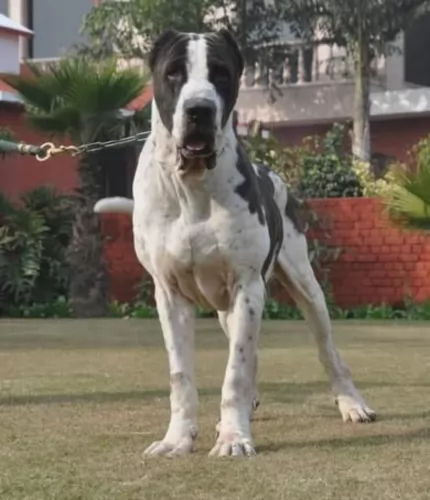 Alangu Mastiff is a breed that ,originates from southern India. Since the very beginning of this breed, it has been used as guard dogs and official dogs of Persian Army. They have been used mostly for wars and as a guard dogs for protection. Also, Alangu Mastiff was used as large gain hunters because of its size and power.
Alangu Mastiff is a breed that ,originates from southern India. Since the very beginning of this breed, it has been used as guard dogs and official dogs of Persian Army. They have been used mostly for wars and as a guard dogs for protection. Also, Alangu Mastiff was used as large gain hunters because of its size and power.
 The Basset Bleu de Gascogne today is a striking looking hound, and is the most reserved o the Basset breeds. When you look at him, their general appearance is large but not too heavy. Long of build, his height at the withers is about 30 – 38cm, and he weighs up to 18kg.
The Basset Bleu de Gascogne today is a striking looking hound, and is the most reserved o the Basset breeds. When you look at him, their general appearance is large but not too heavy. Long of build, his height at the withers is about 30 – 38cm, and he weighs up to 18kg.
He has short legs, thick bones, long floppy ears and dark brown, sad eyes, but is still agile and able to get around quickly. This particular Basset has a short, smooth, dense coat which is black with a white mottled pattern and some tan marking around the feet and face. You’ll most times notice black patches over his ears and sides of his head and there will typically be a white blaze on his skull.
The attractive Basset Bleu de Gascogne is one of 6 Basset Hound breeds, and this one is an energetic, lively dog who possesses a great sense of smell. Easy to train, he slots in well with his human family, wanting to please them all the time. They just love his dark, sorrowful brown eyes and the gentle expression on his face. With his deep bark, he tries to talk to his family. He is fairly easy to train, and with socialization and training he makes an exceptional pet.
Perhaps one aspect of the Basset family that doesn’t go down well with dog owners is their wandering nature. As a scenthound, he often gets the scent of something and wants to put his nose down and follow it. If you haven’t got a sturdy wall or fence around your property, he’ll just wander off.
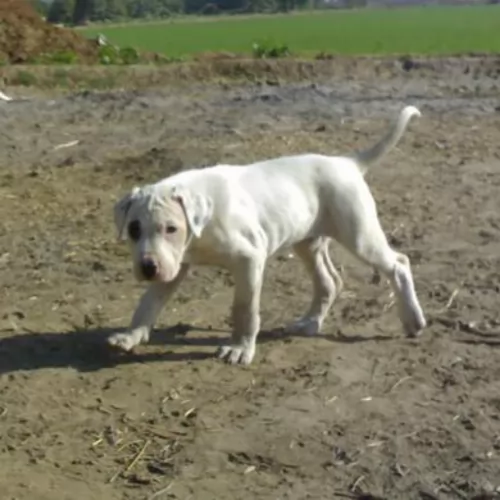 Weight of Alangu Mastiff depends but approximately, male weight is 70-90kg, while females are 60-70kg. While males height is 76-86cm. Females are slightly smaller with an average height of 75-80cm.
Weight of Alangu Mastiff depends but approximately, male weight is 70-90kg, while females are 60-70kg. While males height is 76-86cm. Females are slightly smaller with an average height of 75-80cm.
Lifespan depends drastically on every breed, but it is approximately 8-10 years.
The average litter size of Alangu Mastiff is 6-8 puppies.
Another Name for Alangu Mastiff is Sindh Mastiff.
 This smooth-coated breed with his low-set ears, his sad eyes, out-turned paws and gentle but intelligent pet make this dog an awesome, companionable pet. He is loyal, affectionate and devoted. They’re good with children and other pets, and can even make superb pets for older- or frail people who may lead a more sedentary lifestyle.
This smooth-coated breed with his low-set ears, his sad eyes, out-turned paws and gentle but intelligent pet make this dog an awesome, companionable pet. He is loyal, affectionate and devoted. They’re good with children and other pets, and can even make superb pets for older- or frail people who may lead a more sedentary lifestyle.
The Basset Bleu also sheds a bit less than their Basset Hound counterparts, although they do tend to shed throughout the year. He will require training, just like any dog really, but you don’t want to be harsh with training, as he is a gentle, sensitive dog.
Laid back, this dog which has always been an excellent hunter in days gone by, will make anyone a devoted, loyal friend.
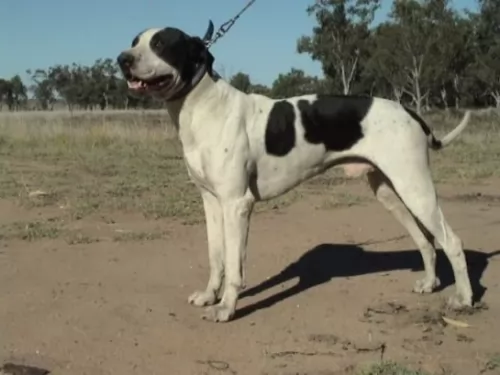 Alangu Mastiff is a very powerful breed. They are a giant breed that is very strong and protective. If you are first time owner, you definitely don’t want this breed as your first pet. They can be very aggressive, and if you are not a dominant owner who knows what he is doing all the time, you can have a lot of troubles with this breed. Alangu Mastiff is a guard dog, and they tend to protect the family no matter what is happening. Of course, with proper care and socialization, they can be wonderful pets that love family, and they can be gentle with children too. Basically, it is very important to socialize them from the earliest age. Alangu is also very hard to train, so you have to be patient and devote a lot of time to train your dog properly. Since they are large dogs, they require a lot of exercises. Walking with the leash is not enough for this breed. They need to run to be fully happy. They can be very aggressive towards other dogs, so it is not very recommendable to spend time with other pets, at least not if they are not socialized. If you train them from an early age, then you should still be careful how your dog behaves around other pets and animals. Don’t get this wrong, Alangu can be a wonderful pet for the whole family, but you have to be careful and well-trained for this breed. They require a lot of attention, patience and time, but overall they can be amazing pets.
Alangu Mastiff is a very powerful breed. They are a giant breed that is very strong and protective. If you are first time owner, you definitely don’t want this breed as your first pet. They can be very aggressive, and if you are not a dominant owner who knows what he is doing all the time, you can have a lot of troubles with this breed. Alangu Mastiff is a guard dog, and they tend to protect the family no matter what is happening. Of course, with proper care and socialization, they can be wonderful pets that love family, and they can be gentle with children too. Basically, it is very important to socialize them from the earliest age. Alangu is also very hard to train, so you have to be patient and devote a lot of time to train your dog properly. Since they are large dogs, they require a lot of exercises. Walking with the leash is not enough for this breed. They need to run to be fully happy. They can be very aggressive towards other dogs, so it is not very recommendable to spend time with other pets, at least not if they are not socialized. If you train them from an early age, then you should still be careful how your dog behaves around other pets and animals. Don’t get this wrong, Alangu can be a wonderful pet for the whole family, but you have to be careful and well-trained for this breed. They require a lot of attention, patience and time, but overall they can be amazing pets.
 A great aspect with Basset Bleus is that they have very few health issues and are quite laid back. They can easily get to 14 years of age and older with good nutrition and exercise. Nothing is set in stone however, and every breed can suddenly develop health problems.
A great aspect with Basset Bleus is that they have very few health issues and are quite laid back. They can easily get to 14 years of age and older with good nutrition and exercise. Nothing is set in stone however, and every breed can suddenly develop health problems.
Dogs like this with a deep chest can be prone to a condition known as gastric dilatation volvulus or bloat. This is a condition not to be taken lightly as it can be life threatening. Gastric dilatation volvulus means twisted stomach because of excessive gas or flatulence and your dog will require prompt treatment.
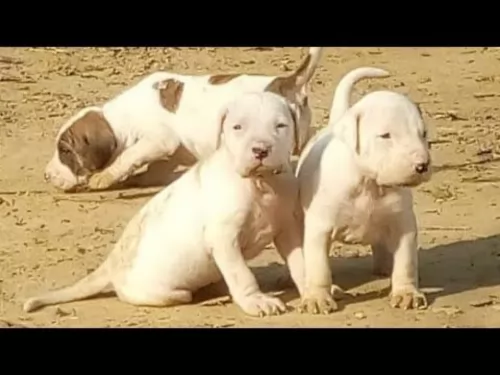 Basically most of the health problems depend on the dog to dog. If you choose puppy carefully, with an adequate examination of professional you will have a healthy dog. Alangu Mastiff is overall healthy breed, but as every other breed, they can develop some issues. Hip dysplasia is can be common for this breed, but again, only if you don’t select your puppy carefully.
Basically most of the health problems depend on the dog to dog. If you choose puppy carefully, with an adequate examination of professional you will have a healthy dog. Alangu Mastiff is overall healthy breed, but as every other breed, they can develop some issues. Hip dysplasia is can be common for this breed, but again, only if you don’t select your puppy carefully.
 With his short coat, shedding isn’t a huge issue with the Basset Bleu. He sheds seasonally and then you will definitely have to brush him at least twice a week to get rid of all that loose hair.
With his short coat, shedding isn’t a huge issue with the Basset Bleu. He sheds seasonally and then you will definitely have to brush him at least twice a week to get rid of all that loose hair.
Some dog owners don’t get used to the slobbering of these dogs. Certainly, you will need to change his drinking water often because of this slobbering of his. It can result in the water containing viruses and bacteria which can cause infections in your dog.
These dogs tend to be lazy at home, so it will be up to you to see that he gets a good quota of exercise to prevent him becoming fat and prone to more illnesses. The backs, especially with added weight, can cause problems and this kind of dog shouldn’t be encouraged to jump off beds and couches.
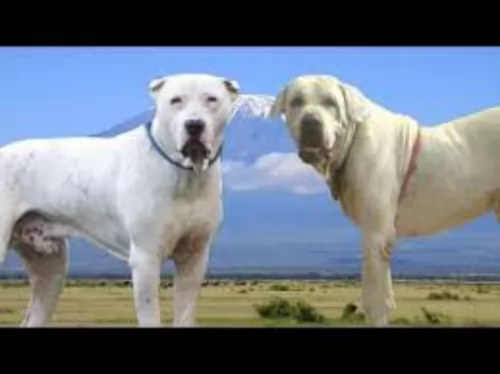 Feeding of your dog highly depends on activity, size, and food that you are feeding your dog. 5-10 cups of high-quality food divided into 2 meals would be enough for an average Alangu Mastiff, but again, you should feed your dog based on activity.
Feeding of your dog highly depends on activity, size, and food that you are feeding your dog. 5-10 cups of high-quality food divided into 2 meals would be enough for an average Alangu Mastiff, but again, you should feed your dog based on activity.
Puppies must eat 3-5 times per day, few cups of high-quality food. They need to eat quality food with a lot of vitamins and minerals to develop into a happy and healthy adult.
Groming is one of the easiest jobs that you should do around your Alangu Mastiff. They are very easy to take care off. Few brushes every now and then would be enough to have perfectly groomed pet. They do not have long coats with a lot of fur so there will be no hair around the house, and maintaining this majestic creature is very easy.